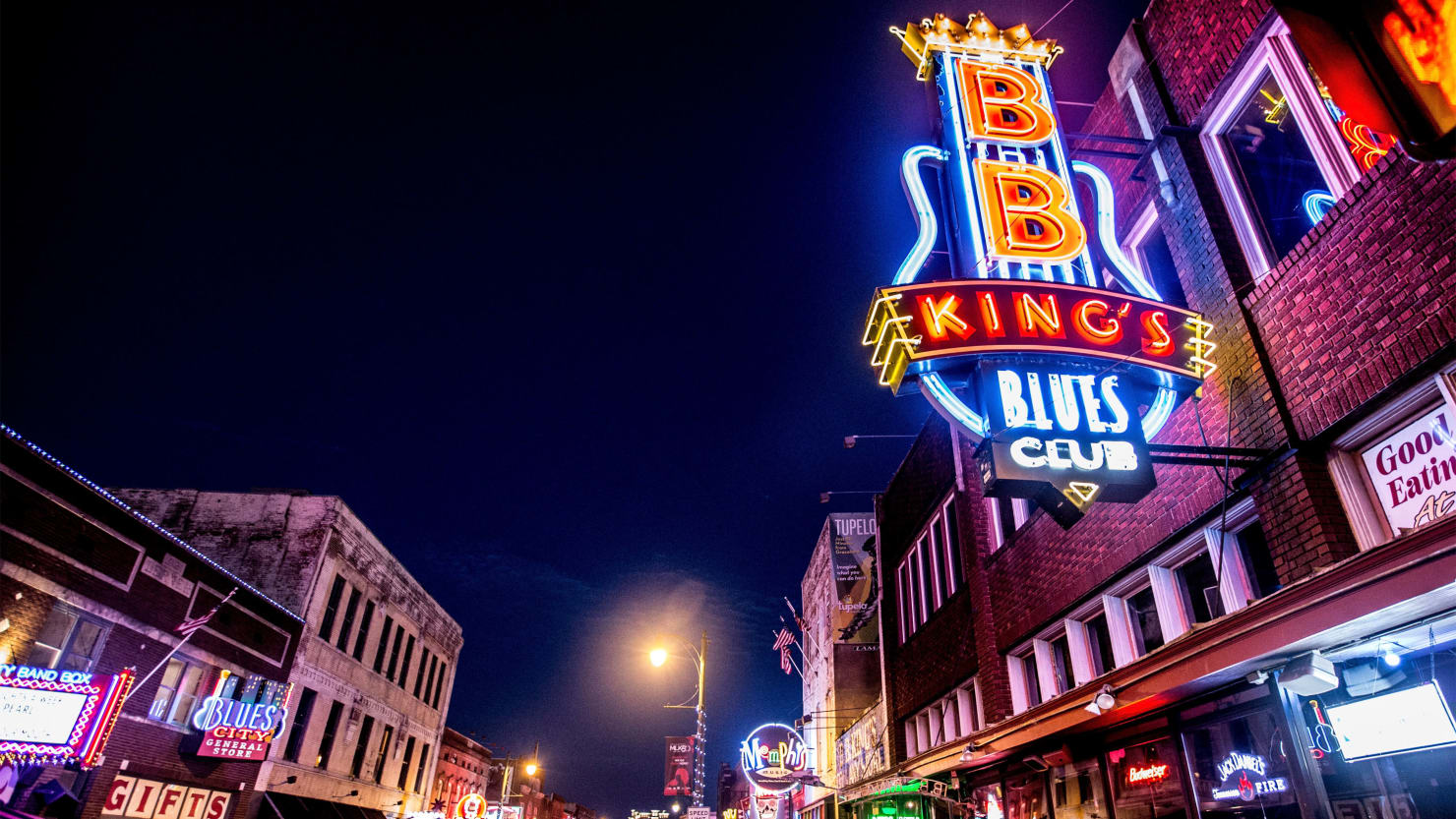Rock ’n’ roll is arguably America’s most successful cultural export. From the Sahara to the Steppes, from the suburbs of the Midwest to the slums of Medellín, rock ’n’ roll—the devilishly charming bastard child of the blues and country music—crosses every linguistic, cultural, and even religious barrier. Promiscuous by nature, it blends seamlessly with local rhythms wherever it goes—amalgamating accordion riffs in Argentina, Tuareg melodies in Algeria, or Viking poetry in Iceland. But in all languages and cultures, it evokes that same sweet emotion of freedom, rebelliousness, and the thrill of being young.
Rock ’n’ roll now belongs to the world, but its native country is the American South, and that distinctive Southern drawl of its youth will never entirely fade.
The open road, another quintessential symbol of America, pairs as deliciously with rock ’n’ roll as infatuated groupies with lead guitarists. The following road trip, cutting across the heart of the South, showcases five cities seminal to rock history: Jacksonville, Macon, Muscle Shoals, Chattanooga, and Memphis.
From Little Richard and Elvis to Lynyrd Skynyrd and Bessie Smith, these cities have produced a Pleiad of virtuosos, trailblazers, and wildly colorful characters. In each city, we’ll explore rock history but also listen to latter-day rockers keeping the genre as exhilarating today as it was in the ’70s or ’50s. Our journey covers four states—Florida, Georgia, Alabama, and Tennessee—with topographies as varied as the Atlantic coast, the Appalachian Mountains, and the muddy shores of the Mississippi River. So, cue up Sticky Fingers or Eat a Peach, drop the top back, and get ready to rock.
Jacksonville
The turquoise waters of north Florida christen our rock ’n’ roll odyssey. While Jacksonville is best known for idyllic beaches and balmy weather, this busy seaport has produced an outsized number of world-class performers: Ray Charles, Lynyrd Skynyrd, the Allman Brothers, and ’90s alternative sensations Limp Bizkit and Shinedown, to name a few.
The Gray House, a suburban residence in JAX, is the site where, in the late ’60s, a series of psilocybin-fueled jam sessions convinced two brothers and their friends to form a band, the Allman Brothers. While the iconic Southern balladeers made their name in Georgia, they never forgot their roots in north Florida.
A mainstay of Jacksonville’s African-American community for more than century, the Ritz Theater was an essential stop on the famous Chitlin Circuit, a string of venues across the South that welcomed Black performers during segregation. The Ritz Theater houses a museum dedicated to Jacksonville’s music history, and regularly hosts live performances in the evening. After touring the Ritz, grab a beer in the surrounding neighborhood of LaVilla, once hailed as the “Harlem of the South.”
The St. Augustine Amphitheater, 45 minutes from Jacksonville, is among Florida’s most hallowed stages—a venue cherished by Lynyrd Skynyrd, Marshall Tucker Band, and the Allman Brothers—and today, you can still catch big-name acts at the Amphitheater. For more casual venues, head to Intuition Ale Works or Jack Rabbits Live for stiff drinks, live music, and all-around revelry. Right by the beach is Beach Hut Cafe, a no-frills eatery owned by the mother of Fred Durst, Jacksonville native and Limp Bizkit front man.
JAX boasts some of the prettiest beaches on the East Coast—think powdery sand and sapphire water—and Neptune Beach, near downtown, is a local favorite for fun in the sun.
Macon, Georgia
Drive 3.5 hours north from Jacksonville to Macon, a charming burg in the Georgia Piedmont. Founded as a trading post between New Orleans and New York, Macon developed into a thriving railroad junction in the late 19th century. In addition to producing musical phenoms like Otis Redding, Little Richard, and Jason Aldean, Macon has raised several notable pro boxers; an old chestnut goes that, back in the day, you had to sing or swing your way out of Macon.
Visit the storied Capricorn Studios, the label behind the Allman Brothers, Marshall Tucker Band, and Gov’t Mule. In collaboration with Mercer University, Capricorn houses an exhibit dedicated to Macon’s star-studded roster of soul and rock musicians. Within walking distance is H&H Restaurant, an institution for savory grits, fried chicken, and other scrumptious plates of soul food. Mama Louise, H&H’s beloved owner, fed the Allman Brothers for free when they were penniless hippies. Later, when the band struck it big, the rockers appointed the Macon matron as their official chef on tour, and a massive mural outside the restaurant commemorates this friendship. To explore more of the Allman Brothers’ history, go to Big House Museum, a shrine to the great Dixie troubadours. Within an easy drive of the Big House, Rose Hill Cemetery is the final resting place of Duane and Greg Allman, as well as their fellow bandmates Butch Trucks and Berry Oakley. Also, the inspiration for the Allman’s seven-minute psychedelic jam “In Memory of Elizabeth Reed” came from a headstone Dickey Betts, the band’s bassist, saw in Rose Hill.
You can also pay your respects to the king of crooners, Otis Redding. The Otis Redding Foundation, a museum run by his surviving family, houses memorabilia and instruments. Macon honors Otis, and other musical luminaries, in a walk of fame outside the Douglass Theater, a venue opened in 1921 by Charles Douglass, one of the country’s first Black millionaires. You can still catch fantastic shows at the Douglass or other time-honored venues like Grant’s Lounge or the Hummingbird. The Woodward Hotel, inside a historic, weathered brick building, is a stone’s throw from just about anywhere in Macon. Behind a metal service door in the back of the Woodward is Quill, a gorgeous speakeasy slinging Macon’s finest cocktails.
Chattanooga
Leaving Macon, 3.5 hours on the road brings us to Chattanooga, a Tennessee city in the foothills of the Appalachian Mountains. For decades, Chattanooga’s 9th Street, “The Big 9,” vied with Bourbon Street in New Orleans and Beale Street in Memphis as the South’s most exuberant Black music hub. Several of the taverns and theaters on 9th Street, recently renamed Martin Luther King Boulevard, were essential stops on the Chitlin Circuit.
Start at the Bessie Smith Museum on 9th Street. The museum not only pays tribute to the Empress of the Blues and other great Black Chattanoogan musicians but also houses excellent exhibits on African-American history in Middle Tennessee. Uncle Larry’s Restaurant, near the museum, fries up the tastiest catfish anywhere in the South. Nearby Hutton & Smith Brewery pours some of Chatt Town’s finest suds.
“Beale Street, a roaring, neon-drenched avenue slicing through downtown, was an essential stop on the Chitlin Circuit.”
Songbirds Museum might be the country’s most impressive rock history museum outside of the Rock ’n’ Roll Hall of Fame in Cleveland. Songbirds houses a dazzling collection of rare guitars and tells the story of the evolution of the six-stringed axe. After exploring the museum’s exhibits, return to Songbirds in the evening for fantastic live shows. The Tivoli and Walker Theater are historic venues in Chattanooga with regular live music, and the Boneyard, a lively public house next to Songbirds, hosts performances most nights, free of cover charges. Beyond music history, Chattanooga is a gem for climbing, hiking, and river sports. For a thrilling way to explore the mountains, book a swincar through Adventure Sports Innovation. The vehicles, mountain goat-like contraptions imported from France, are specially designed for ranging over steep trails.
Muscle Shoals
Crossing the Alabama line, you’ll reach Muscle Shoals in about 3 hours. Music is to Muscle Shoals what football is to small towns in West Texas. Locals grow up playing in school marching bands, singing in church choirs, and jamming with friends and family on porches. This grassroots passion for music might explain why so many legends have recorded here. A plethora of melodic giants, including Bob Dylan, Alicia Keys, Bob Seger, and Aretha Franklin, point to recording sessions in Muscle Shoals as the most creative periods of their careers.
Visiting FAME Studios and Muscle Shoals Sound Studio is a must. Within these hallowed walls, the Swampers, local boys from Muscle Shoals, played their distinctively soulful and funky riffs behind the vocals of Lynyrd Skynyrd, Percy Sledge, and countless other stars. Listen carefully to Sweet Home Alabama, and you’ll hear Skynyrd’s homage to the Swampers. For nonpareil Southern hospitality, delicious BBQ, and live rock ’n’ roll, look no further than Champy’s Restaurant. The Rattlesnake Saloon and Flobama are two more popular venues for soaking up cheap beer and bluesy guitar riffs. Finally, don’t leave Muscle Shoals without a downhome Southern repast at Arnold’s Truck Stop, a hole-in-the-wall eatery beloved by locals and visiting rock stars alike.
Memphis
A mere 2.5 hours on Highway 72 takes us back to Tennessee, this time to Memphis. Southern flaneur and writer David Cohn once quipped, “The Mississippi Delta begins in the lobby of the Peabody Hotel in Memphis and ends on catfish row in Vicksburg.” Musically speaking, Memphis contains multitudes: Grind City has churned out stars in genres as varied as rock ’n’ roll, the Blues, hip-hop, and country.
An evening on Beale Street and a daytrip to Graceland are mandatory items of business. Like Chattanooga’s Big 9, Beale Street, a roaring, neon-drenched avenue slicing through downtown, was an essential stop on the Chitlin Circuit. Johnny Cash, Robert Johnson, B.B. King, and many other godfathers and godmothers of rock ’n’ roll cut their teeth in Memphis theaters and honky-tonks. You can pound oversized beers and listen to masterful musicians in scores of bars on Beale Street, but the New Daisy, originally a movie theater from the 1930s, is particularly memorable. Overton Square is another hoary Memphis theater where bands like Kiss, Billy Joel, and the Styx got big breaks early in their careers. Delegate at least an hour to explore the Stax Museum, dedicated to soul-music history, and housed inside a legendary former recording studio.
And, of course, Memphis beckons tourists—often better described as pilgrims—from every corner of the world for a specific reason: The King. Elvis Aaron Presley was born in nearby Tupelo but grew up in Memphis and acquired his musical chops on Beale Street. After the White House, Graceland, Elvis’s mansion, is the most famous home in the U.S., receiving over half a million visitors each year. A standard visit to Graceland takes about two hours and covers Elvis’ mansion and car collection. Make sure to book in advance. Don’t sleep on Memphis BBQ, either. Along with North Carolina, Texas, and Kansas City, Memphis ranks among America’s great BBQ capitals. For classic Memphis Q, brave the lines at Central BBQ, Tops, or The Rendezvous. And if you’re in the mood for comforting, deep-fried deliciousness, The Four Way is a Memphis classic for soul food.






